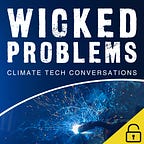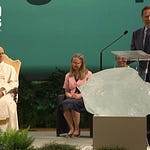Tim McDonnell of Semafor discusses the shifting dynamics of climate and energy policy in both the US and the UK. As political leaders struggle to balance energy security, climate action, and public perception, they explore the "green hush" happening in campaign messaging—why politicians are avoiding direct references to climate change and how this could impact both policy and public engagement.
The Green Hushing Phenomenon:
"Green hushing" has emerged as a tactic in political campaigns, with politicians framing climate policy in terms of jobs, economic growth, and energy independence rather than climate impacts. Tim discusses how this strategic messaging shift might resonate with voters, particularly those in swing states like Pennsylvania.
The UK's Conservative Party and Climate Policy:
Turning to the UK, they explore how political leaders such as Robert Jenrick are echoing skeptical stances on net zero commitments, driven in part by a broader conservative narrative of climate action as an economic burden. Richard and Tim highlight the similarities between messaging in the UK and the US, examining how climate denial has evolved into opposition to climate costs.
Climate Messaging in Campaign Ads:
The duo analyzes recent campaign ads from environmental coalitions like the League of Conservation Voters and Environmental Defense Fund, which conspicuously avoid mentioning climate change, instead focusing on cost-of-living issues and corporate accountability. What does this say about the perceived salience of climate as a campaign issue?
Implications of the "Dog That Didn't Bark":
Richard and Tim reflect on the broader implications of the absence of climate discourse in the political spotlight, particularly in light of recent natural disasters in the Southeastern United States. They question how this "silence" may impact public awareness, climate activism, and ultimately, policy effectiveness.
Transatlantic Messaging Echoes:
The conversation also touches on the global nature of climate messaging, with the same rhetoric appearing across the US, UK, and even other parts of Europe. They discuss the role of think tanks and political alliances in propagating these talking points.
Key Moments:
[00:03:00] - Introduction: Recap of the DNC and the notable absence of direct climate messaging.
[00:10:20] - Tim McDonnell on the “green hushing” approach in Kamala Harris’ campaign.
[00:19:50] - The UK's Conservative Party and skepticism around net zero: Comparing US and UK narratives.
[00:28:30] - Richard shares insights on climate campaign ads and their strategic avoidance of climate language.
[00:37:45] - Recent climate disasters in the Southeastern US and the “silent” climate policy response.
[00:45:15] - Outro reflections: The need for direct climate discourse in politics.
Subscribe:
If you found value in this conversation, subscribe at wickedproblems.earth for more deep dives into the intersections of climate, tech, and politics. Support our work by becoming a paid subscriber, and help us expand our coverage of climate tech issues.















